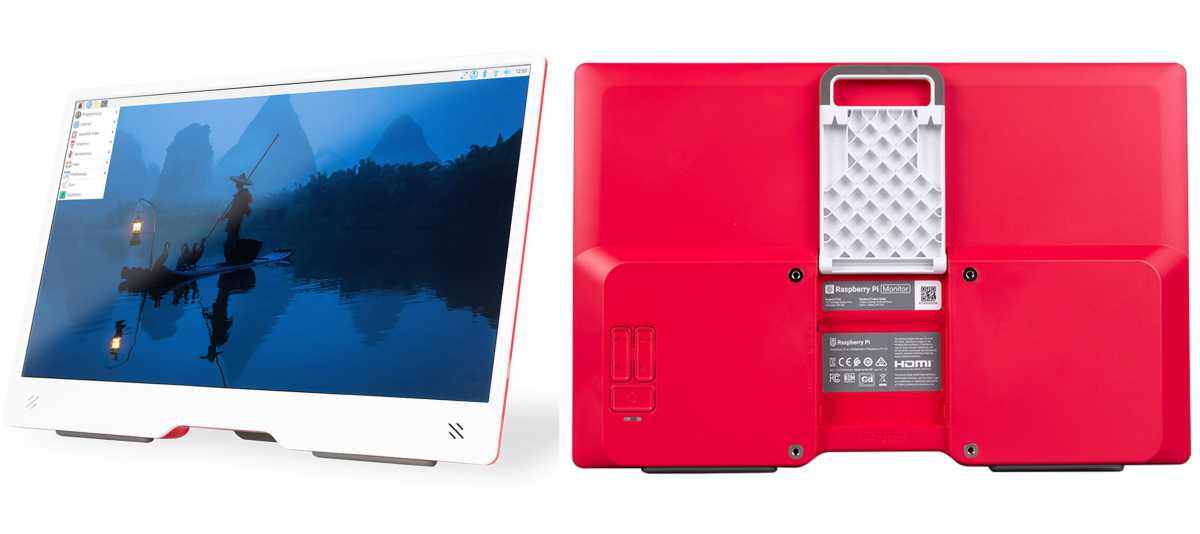- Регистрация
- 17 Февраль 2018
- Сообщения
- 29 377
- Лучшие ответы
- 0
- Баллы
- 2 093
Offline
The Raspberry Pi 400 was a hit when it came out in 2020, harkening back to the days when people would stuff a whole computer under the gigantic keys of an old-fashioned keyboard. If you love that form factor but need something a little more beefy, the new Raspberry Pi 500 is here with the same design but upgraded Pi 5 guts.
The Pi 500 is a standalone computer with all the connections you need along its top edge. But if you’re also looking for a matching monitor, you’re in luck because the company just released its first home-grown monitor, a spiffy-looking 15.6-inch model. It can work as a travel display or a small conventional desktop monitor thanks to its VESA mount, and it’s a pretty darn good deal at just $100. It’ll even power up from a Raspberry Pi alone, so long as you have a spare USB-A port to deliver a little extra juice.
I really like the look of the monitor, with its red-on-white coloring, a kickstand that doubles as a carry handle, and a stylish cutout on the lower bezel. Normally, I’d be down on its inclusion of a pair of extremely low-power speakers, but considering this is meant to be a companion to extremely flexible, affordable computer designs, I guess it makes sense.

Raspberry Pi
The 1080p panel isn’t exactly the sharpest in the world, but with a standard HDMI port it can work as a pretty good and affordable monitor for a small space. Just be aware that it doesn’t come with a power supply, so you’ll need to supply 15 watts if you’re not powering it directly from your Pi or another computer. Also note that while the monitor is powered by USB-C, it doesn’t actually get its video signal via USB-C, so it needs more cables than your typical portable monitor.
The upgraded Pi 500 keyboard uses the Pi 5 as its base with 8GB of memory and the 2.4GHz quad-core Cortex A76 processor. The top edge has dedicated ports for Ethernet, USB-A (three, at various speeds), USB-C for power, double Micro HDMI for dual 4K output, and a microSD card slot, in addition to the exposed 40-pin GPIO port loved by modders. The Pi 500 flips the port layout versus the original design, and also ditches that red bottom of the case, which is a bit of a bummer.
So far, the only place that has the Pi 500 in stock is CanaKit, which is selling just the primary hardware (without the power supply, mouse, and Micro HDMI adapter that’s sometimes bundled with the Pi 400) for $90. It looks like it might not include a microSD card (where the operating system lives) either, so plan accordingly.
The Pi 500 is a standalone computer with all the connections you need along its top edge. But if you’re also looking for a matching monitor, you’re in luck because the company just released its first home-grown monitor, a spiffy-looking 15.6-inch model. It can work as a travel display or a small conventional desktop monitor thanks to its VESA mount, and it’s a pretty darn good deal at just $100. It’ll even power up from a Raspberry Pi alone, so long as you have a spare USB-A port to deliver a little extra juice.
I really like the look of the monitor, with its red-on-white coloring, a kickstand that doubles as a carry handle, and a stylish cutout on the lower bezel. Normally, I’d be down on its inclusion of a pair of extremely low-power speakers, but considering this is meant to be a companion to extremely flexible, affordable computer designs, I guess it makes sense.

Raspberry Pi
The 1080p panel isn’t exactly the sharpest in the world, but with a standard HDMI port it can work as a pretty good and affordable monitor for a small space. Just be aware that it doesn’t come with a power supply, so you’ll need to supply 15 watts if you’re not powering it directly from your Pi or another computer. Also note that while the monitor is powered by USB-C, it doesn’t actually get its video signal via USB-C, so it needs more cables than your typical portable monitor.
The upgraded Pi 500 keyboard uses the Pi 5 as its base with 8GB of memory and the 2.4GHz quad-core Cortex A76 processor. The top edge has dedicated ports for Ethernet, USB-A (three, at various speeds), USB-C for power, double Micro HDMI for dual 4K output, and a microSD card slot, in addition to the exposed 40-pin GPIO port loved by modders. The Pi 500 flips the port layout versus the original design, and also ditches that red bottom of the case, which is a bit of a bummer.
So far, the only place that has the Pi 500 in stock is CanaKit, which is selling just the primary hardware (without the power supply, mouse, and Micro HDMI adapter that’s sometimes bundled with the Pi 400) for $90. It looks like it might not include a microSD card (where the operating system lives) either, so plan accordingly.
